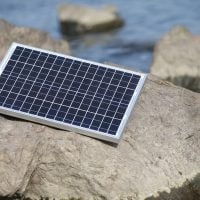Deadline: 28-Mar-23
The European Commission (EC) is offering grants to support the Interdisciplinary assessment of changes affecting terrestrial and freshwater ecosystems, building on observation programmes.
Scope
- These activities will foster a collective effort in the EU Member States and Horizon Europe Associated Countries to assess the status of terrestrial, freshwater, and transitional (land to sea) ecosystems and prioritise conservation and restoration actions of these ecosystems including reduction of GHG missions and increases of carbon removals, with a special focus on the use of the wealth of Earth and Observation data available (remote-sensing, airborne, in-situ data).
- Use long-time series from the enhanced Earth Observation capacity in Europe (e.g. Copernicus) and in International Programmes together with other relevant sources of data to better understand the current and long-term dynamics and functioning of terrestrial and freshwater ecosystems in Europe under conditions related to global change
- Extensive use of ground based and/or airborne in-situ observation using, as appropriate, existing networks, novel observing systems, or citizen science, together with satellite data for assessing the impact of the main natural and anthropogenic pressures on the ecological processes of natural ecosystems, and on their dynamics and functioning (i.e., addressing individual and cumulative effects of multiple stressors), including in exploiting available high-resolution remote-sensing data.
- Assess the status and dynamics of these ecosystems, estimate their vulnerability to multiple stressors including anthropogenic and natural pressures, like climate change, and assess the impact of these stressors on the integrity and resilience of ecosystems
- Modelling of the ecological processes of natural ecosystems and of their interaction with the Earth System (i.e. biological, physical, and chemical processes, including primary production).
- Improving modelling of ecological processes and functional biodiversity under land-use and climate change that leads to ecosystem degradation (i.e. degraded, damaged, and destroyed ecosystems)
- Monitoring the status of natural ecosystems and assessment of the changes in relation to the underlying ecological processes.
- Integrate monitoring and modelling products into existing observatories supporting ecosystem management and conservation, to achieve better prioritisation, design and monitoring of terrestrial and freshwater ecosystem conservation and restoration actions”
- This topic is part of a coordination initiative between the European Space Agency (ESA) and the European Commission (EU funded programmes) on Earth System Science. The ESA-EC Earth System Science Initiative enables EC and ESA to support complementary collaborative projects, funded on the EU side through Horizon Europe and on the ESA side through the FutureEO programme.
- In particular, ESA plans to complement, collaborate and coordinate with the action funded under this topic with dedicated scientific activities within the ESA Biodiversity Science Cluster (biodiversitysciencecluster.esa.int) which is part of Science for Society element of ESA FutureEO programme. ESA will also, to the extent possible, provide access to relevant resources.
- Proposals should address the collaboration with ongoing or future ESA projects and should towards this end include sufficient means and resources for effective coordination. Applicants are encouraged to enter in contact with the relevant ESA biodiversity science cluster projects and include in their proposals a work package/activities to ensure coordination with ESA relevant actions. The ESA biodiversity cluster focusses on the development, validation, and scientific analysis of novel satellite data products, the characterisation the structure and dynamics of terrestrial and freshwater ecosystems, the exploitation of the synergistic observation opportunities offered by the existing and coming Earth Observation missions (e.g., Copernicus sentinels, Earth Explorers, national missions) and advancing on the understanding of the response of ecosystems to different stressors using satellite technology.
- Project activities shall fully exploit and build complementarities with the ongoing work regarding the establishment of the European Open Science Cloud and interact with relevant projects developing metadata standards and added value tools to ensure interoperability within and across fields of study.
Funding Information
- The check will normally be done for the coordinator if the requested grant amount is equal to or greater than EUR 500 000, except for:
- public bodies (entities established as a public body under national law, including local, regional or national authorities) or international organisations; and
- cases where the individual requested grant amount is not more than EUR 60 000 (low value grant).
Expected Outcome
- The expected outcomes should feed in the implementation of the European Green Deal and the post-2020 global biodiversity framework of the Convention on Biological Diversity (CBD). Project results are expected to contribute to the following impact of destination “Biodiversity and ecosystem services”: “Understand and address direct drivers of biodiversity decline – land and sea use change, natural resource use and exploitation, climate change, pollution, invasive alien species – as well as indirect drivers – demographic, socio-economic, technological, etc.”
- Project results are expected to contribute to all of the following outcomes:
- Attribution of ecosystem changes to direct and indirect drivers, and monitoring of driver effects on ecosystems through time;
- Enhanced understanding of the adverse impacts of climate change on biodiversity and ecosystem functioning;
- Enhanced science base, leading to better design and monitoring conservation and restoration actions for terrestrial, freshwater, and transitional ecosystems, including the reduction of greenhouse gas emissions, and increase of carbon removals, and supporting nature-based solutions;
- Enhanced support to a better alignment of the objectives and priorities of the relevant EU directives;
- Better and more transparent quantification of various uncertainties in ecosystem data and models, and propagation of these uncertainties into monitoring, spatial prioritization, and other applications.
Expected Impact
- Proposals for topics under this destination should set out a credible pathway resulting in the strategic plan having the following impact: “Biodiversity is back on a path to recovery, and ecosystems and their services are preserved and sustainably restored on land, inland water and at sea through improved knowledge and innovation. More specifically, one or more of the following impacts should materialise:
- Direct drivers of biodiversity decline will be understood and addressed – land and sea use change, natural resource use and exploitation, climate change, pollution, invasive alien species – as well as indirect drivers – demographic, socio-economic, technological, etc.
- Protected areas and their networks will be planned, managed and expanded and the status of species and habitats will be improved based on up-to-date knowledge and solutions.
- Biodiversity, ecosystem services and natural capital will be mainstreamed in the society and economy: e.g. they will be integrated into public and business decision-making; approaches for enabling transformative changes to tackle societal challenges will be built including by deploying nature-based solutions (NBS).
- Practices in agriculture, forestry, fisheries and aquaculture will be developed and improved to support and make sustainable the use of biodiversity and a wide range of ecosystems services.
- Biodiversity research and support policies and processes will be interconnected at EU and global levels, making use of advanced digital technologies and societal engagement where appropriate.
- The biodiversity and health nexus will be understood, in particular at the level of ecosystems. This will be achieved by using the one-health approach, in the context of climate change and globalisation and by addressing contributions and trade-offs.
- The impacts have been revised compared with the 2021-2022 work programme in order to take into account R&I activities included in the 2021-2024 strategic plan, but that is yet to be addressed. This was the case, for instance, for several direct drivers of biodiversity loss. The new drafting of the impacts makes clear that they are within the scope of the work programme.
Eligible Activities
- Eligible activities are the ones described in the call conditions. Applications will only be considered eligible if their content corresponds, wholly or in part, to the topic description for which it is submitted.
- Projects must focus exclusively on civil applications and must not:
- aim at human cloning for reproductive purposes;
- intend to modify the genetic heritage of human beings which could make such changes heritable (except for research relating to cancer treatment of the gonads, which may be financed);
- intend to create human embryos solely for the purpose of research, or for the purpose of stem cell procurement, including by means of somatic cell nuclear transfer.
- Projects must, moreover, comply with EU policy interests and priorities (environment, social, security, industrial policy, etc.).
- The following activities are generally eligible for grants under Horizon Europe:
- Research and innovation actions (RIA) — Activities that aim primarily to establish new knowledge or to explore the feasibility of a new or improved technology, product, process, service or solution. This may include basic and applied research, technology development and integration, testing, demonstration and validation of a small-scale prototype in a laboratory or simulated environment.
- Innovation actions (IA) — Activities that aim directly to produce plans and arrangements or designs for new, altered or improved products, processes or services. These activities may include prototyping, testing, demonstrating, piloting, large-scale product validation and market replication.
- Coordination and support actions (CSA) — Activities that contribute to the objectives of Horizon Europe. This excludes research and innovation (R&I) activities, except those carried out under the ‘Widening participation and spreading excellence’ component of the programme (part of ‘Widening participation and strengthening the European Research Area’). Also eligible are bottom-up coordination actions which promote cooperation between legal entities from Member States and Associated Countries to strengthen the European Research Area, and which receive no EU co-funding for research activities.
- Programme co-fund actions (CoFund) — A programme of activities established or implemented by legal entities managing or funding R&I programmes, other than EU funding bodies. Such a programme of activities may support: networking and coordination; research; innovation; pilot actions; innovation and market deployment; training and mobility; awareness raising and communication; and dissemination and exploitation. It may also provide any relevant financial support, such as grants, prizes and procurement, as well as Horizon Europe blended finance or a combination thereof. The actions may be implemented by the beneficiaries directly or by providing financial support to third parties.
- Innovation and market deployment actions (IMDA) — Activities that embed an innovation action and other activities necessary to deploy an innovation on the market. This includes the scaling-up of companies and Horizon Europe blended finance.
- Training and mobility actions (TMA) — Activities that aim to improve the skills, knowledge and career prospects of researchers, based on mobility between countries and, if relevant, between sectors or disciplines.
- Pre-commercial procurement actions (PCP) — Activities that aim to help a transnational buyers’ group to strengthen the public procurement of research, development, validation and, possibly, the first deployment of new solutions that can significantly improve quality and efficiency in areas of public interest, while opening market opportunities for industry and researchers active in Europe. Eligible activities include the preparation, management and follow-up, under the coordination of a lead procurer, of one joint PCP and additional activities to embed the PCP into a wider set of demand-side activities.
- Public procurement of innovative solutions actions (PPI) — Activities that aim to strengthen the ability of a transnational buyers’ group to deploy innovative solutions early by overcoming the fragmentation of demand for such solutions and sharing the risks and costs of acting as early adopters, while opening market opportunities for industry. Eligible activities include preparing and implementing, under the coordination of a lead procurer, one joint or several coordinated PPI by the buyers’ group and additional activities to embed the PPI into a wider set of demand-side activities.
Eligibility Criteria
- Any legal entity, regardless of its place of establishment, including legal entities from non associated third countries or international organisations (including international European research organisations) is eligible to participate (whether it is eligible for funding or not), provided that the conditions laid down in the Horizon Europe Regulation have been met, along with any other conditions laid down in the specific call topic.
- A ‘legal entity’ means any natural or legal person created and recognised as such under national law, EU law or international law, which has legal personality and which may, acting in its own name, exercise rights and be subject to obligations, or an entity without legal personality.
- Beneficiaries and affiliated entities must register in the Participant Register before submitting their application, in order to get a participant identification code (PIC) and be validated by the Central Validation Service before signing the grant agreement. For the validation, they will be asked to upload the necessary documents showing their legal status and origin during the grant preparation stage. A validated PIC is not a prerequisite for submitting an application.
- Specific cases:
- Affiliated entities — Affiliated entities (i.e. entities with a legal or capital link to a beneficiary which participate in the action with similar rights and obligations to the beneficiaries, but which do not sign the grant agreement and therefore do not become beneficiaries themselves) are allowed, if they are eligible for participation and funding.
- Associated partners — Associated partners (i.e. entities which participate in the action without signing the grant agreement, and without the right to charge costs or claim contributions) are allowed, subject to any conditions regarding associated partners set out in the specific call conditions.
- Entities without legal personality — Entities which do not have legal personality under their national law may exceptionally participate, provided that their representatives have the capacity to undertake legal obligations on their behalf, and offer guarantees to protect the EU’s financial interests equivalent to those offered by legal persons.
- EU bodies — Legal entities created under EU law including decentralised agencies may be part of the consortium, unless provided for otherwise in their basic act.
- To become a beneficiary, legal entities must be eligible for funding.
- To be eligible for funding, applicants must be established in one of the following countries:
- the Member States of the European Union, including their outermost regions: Austria, Belgium, Bulgaria, Croatia, Cyprus, Czechia, Denmark, Estonia, Finland, France, Germany, Greece, Hungary, Ireland, Italy, Latvia, Lithuania, Luxembourg, Malta, Netherlands, Poland, Portugal, Romania, Slovakia, Slovenia, Spain, Sweden.
- the Overseas Countries and Territories (OCTs) linked to the Member States: Aruba (NL), Bonaire (NL), Curação (NL), French Polynesia (FR), French Southern and Antarctic Territories (FR), Greenland (DK), New Caledonia (FR), Saba (NL), Saint Barthélemy (FR), Sint Eustatius (NL), Sint Maarten (NL), St. Pierre and Miquelon (FR), Wallis and Futuna Islands (FR).
- countries associated to Horizon Europe: Albania, Armenia, Bosnia and Herzegovina, Faroe Islands, Georgia, Iceland, Israel, Kosovo, Moldova, Montenegro, North Macedonia, Norway, Serbia, Tunisia, Turkey, Ukraine.
For more information, visit EC.









































